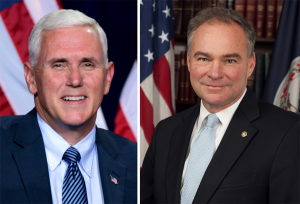Vice Presidential Debate Is Surprisingly Presidential

After an initial presidential debate filled with insults and vague policy prescriptions, the first vice presidential debate held last night at Longwood University was a welcome surprise. The debate, while occasionally contentious, focused largely on policy positions and less so on personality and other factors.
Some of the complex issues discussed at the debate included gun control, implicit racial bias in the police force and the criminal justice system, and of course, the developing foreign policy crises in the Middle East and Eastern Europe.
But the issue that was most likely to grab the attention of humanists and other nontheists was that of the faith of the vice presidential candidates. Both candidates were asked about a time when they struggled to balance their personal faith and a public policy position, and each candidate gave detailed answers that provided a rare insight into the role that faith and politics play on the presidential campaign trail.
Senator Tim Kaine, the running mate of the Democratic nominee Hillary Clinton, said, “I try to practice my religion in a very devout way and follow the teachings of my church in my own personal life. But I don’t believe in this nation, a First Amendment nation, where we don’t raise any religion over the other, and we allow people to worship as they please, that the doctrines of any one religion should be mandated for everyone.”
Kaine continued by stating, “I think it is really, really important that those of us who have deep faith lives don’t feel that we could just substitute our own views for everybody else in society, regardless of their views…We really feel like you should live fully and with enthusiasm the commands of your faith. But it is not the role of the public servant to mandate that for everybody else.”
Indiana Governor Mike Pence, the running mate of the Republican nominee Donald Trump, had a different perspective on the role of faith in a public servant’s life, stating, “My Christian faith is at the very heart of who I am. I was also raised in a wonderful family of faith. It was a church on Sunday morning and grace before dinner. But my Christian faith became real for me when I made a personal decision for Christ when I was a freshman in college. And I’ve tried to live that out however imperfectly every day of my life since… So for me, my faith informs my life. I try and spend a little time on my knees every day. But it all for me begins with cherishing the dignity, the worth, the value of every human life.”
Pence continued by recounting a time a policy position conflicted with his faith, but unlike Kaine he did not support the idea that the faith of the public servant should be second to the laws of the land and the interests of the American people. When discussing partial birth abortion, Pence seemed to suggest that he could never support the practice, even if he was a public official tasked with enforcing a program which allowed for it to occur.
Both candidates have different perspectives on the role of faith in public life, and while Senator Kaine is perhaps more dedicated to supporting a secular government, both candidates missed an opportunity to speak to the quarter of Americans who hold no faith or don’t belong to any religious tradition. This marginalization of the nontheistic community is something that occurred in the presidential debate, and unfortunately will likely continue throughout the presidential campaign season.
So while it was interesting and occasionally encouraging to hear the candidates discuss the role of faith in public life, progress is still warranted before nontheists will truly feel as though their concerns are addressed on an equal level with religious voters.
